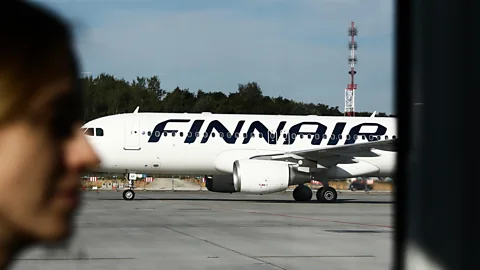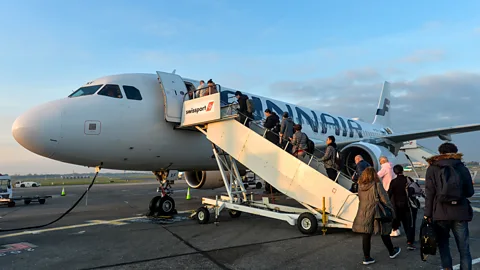Finnair sparks controversy by weighing its passengers
 Getty Images
Getty ImagesAccurate passenger weight data serves a variety of safety purposes, but travellers are criticising Finnair's information-gathering effort.
Finnair's recent roll out of a voluntary passenger weighing system was meant to gather data for flight balance calculations. Instead, it has triggered a firestorm of criticism that the practice amounts to body shaming.
The weighing process, which is taking place in advance of flights departing from Helsinki airport, will be in effect throughout February and also during April and May, according to the airline's programme description.
Finland's national airline, Finnair, is collecting data about both the average weight of customers and their carry-on baggage. According to the airline, the weighing process is anonymous and the "data will only be used to optimise Finnair's current aircraft balance calculations".
"We weigh volunteer customers together with their carry-on baggage. In the measurement, we do not ask for personal data, but the total weight of the customer and carry-on baggage, the customer's age, gender and travel class are recorded in the database. No information is collected that would allow participants to be identified," Satu Munnukka, head of ground processes for Finnair, said in a statement.
The weight information being collected by the airline will be passed along to The Finnish Transport and Communications Agency, which will use it to develop aircraft balance and loading calculations for 2025 through 2030.
American actress and plus-size model Hayley Hasselhoff took issue with the practice during a recent appearance on Good Morning Britain, saying that even though the weight information is not being made public, it's still "triggering to people with eating disorders".
Others criticised the programme via social media, with comments such as "that smells of discrimination" and "I will not be travelling via @Finnair as l won't be #fatshamed by a bloody airline."
 Getty Images
Getty ImagesHasselhoff also expressed concern that the now-voluntary programme could potentially become mandatory in the future.
Finnish airlines said in a statement that under no circumstances would the weight survey become a permanent measure.
“As per aviation regulations, airlines are required to update the average weight of passengers every five years, to ensure the data used for flight planning and aircraft balance calculations is accurate," says the statement. “No one flying with Finnair from Helsinki is under any obligation to be weighed before boarding their flight. It is entirely voluntary. We want to reassure customers that participation is optional and all data collected is anonymous and will not be linked to their personal profiles.
“We are pleased to reveal that 800 people have volunteered to take part in the survey so far, with more expected to take part in the coming days," the statement continued. "As an inclusive airline, we warmly welcome everyone onboard our flights."
A representative for the Finnish Pilots Association (FPA), which represents 1,400 professional pilots in Finland, responded to BBC Travel's request for comment and said the FPA does not have any specific information about the policy beyond what's been made available on Finnair's website. However, the association said it supports the initiative.
"From what we have understood, the aim is to re-evaluate the information used as standard weights for passengers and determine whether it is still accurate or whether there is a need to adjust the values," Lauri Soini, chair of the Finnish Pilots Association Safety and Security Committee, told BBC Travel.
Soini added that while Finnair knows the weight of all other aspects associated with flying, it does not have accurate weight data related to passengers and their hand luggage. The airline made the same point in its press release about the programme, explaining that it is currently relying upon average weight data for passengers and luggage that it collected and provided to the Civil Aviation Authority back in 2017. The airline is required to update those figures every five years, which is why it is now gathering weight data once again.
"This operation [will provide] more accurate values for the different performance calculations," Soini continued. "Weight plays a factor in including, but not limited to, takeoff, landing and climb performance and also how much fuel the aircraft uses during the flight. The more the aircraft weighs, the more it burns fuel."
All aircrafts have limitations on the total weight they can bear and take off with, added George Ferguson, global head of aerospace, defense and airline research for Bloomberg Intelligence.
Having accurate weight information is also important to maintaining the centre of gravity for the plane because "you can't put too much weight in the front or the back of the plane," Ferguson explained.
While planning assumptions for all of these calculations are currently based on the average weight of passengers and the average weight of carry-ons, those averages have likely changed over time, he said. This may be especially true as airlines have implemented steep fees for checking bags and more passengers are carrying on as much as they can to avoid paying the luggage charge, added Ferguson.
That's not all that's likely to have changed over time: "As airlines become more and more low-cost and jam more and more people inside the aeroplane, those tolerances become more critical," Ferguson added.
"This is critical information for an airline to understand," Ferguson concludes. "I would hope, when it comes to safety, more people would opt in so that the airline can recalibrate their expectations – because populations change over time and trends change over time."
Finnair is not the first carrier to publicly gather weight information. Air New Zealand made news last year for conducting a similar effort. In that case, passengers boarding flights leaving from Auckland, New Zealand were asked to get on a scale before flying abroad with the carrier. The programme was explained at the time as a way to gather "real-world information." Airline representatives told NPR that the information-gathering was mandated by the country's Civil Aviation Authority.
Brian Sumers, founder and editor of The Airline Observer, which is dedicated to covering the business of airlines, said there's a great deal of information required to fly a plane safely that the public may simply not understand.
"There are quite a few math calculations that go into making sure an airliner can lift off and fly long distances," says Sumers. "For one, every aeroplane has a maximum takeoff weight. If it is too heavy, it will not be cleared to leave the gate. There's also the question of when an aeroplane lifts off the runway. A heavier aeroplane needs more runway length before it can lift off."
"Airlines know what an empty aircraft weighs, but they need to understand the heft of all the stuff they add to it – like fuel, bags, cargo and, yes, humans," Sumers added. "They're not trying to embarrass anyone. They just want – or need – to have accurate data."
If you liked this story,sign up for The Essential List newsletter – a handpicked selection of features, videos and can't-miss news delivered to your inbox every Friday.
